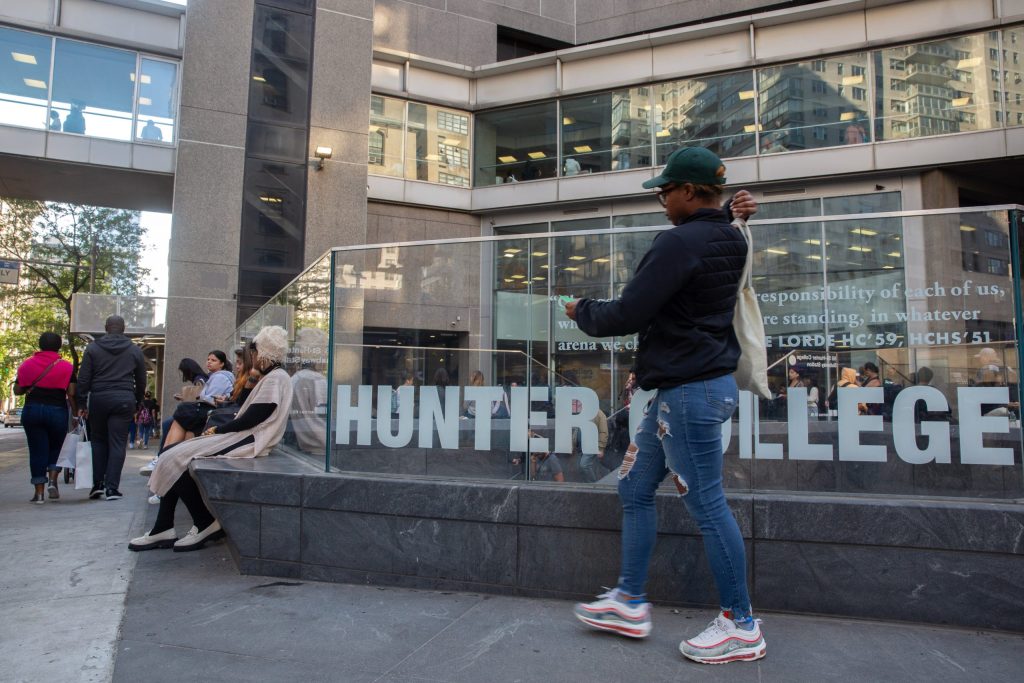CUNY chancellor Félix Matos Rodríguez on Wednesday laid out a roadmap for expanding the university in the year ahead while reflecting on the enrollment growth at the 25-school system over the last year.
At a state of the university address at the City College of Technology Wednesday, Matos Rodríguez pointed out that university-wide enrollment is up for the second year in a row, with 3% more students matriculating this year than last — contributing to a 15,000-student gain over the past two years.
The spike was particularly pronounced at community colleges, which saw a 6% increase. The number of graduate students also increased for the first time in four years, by 4%, or roughly a thousand students.
“This is uplifting, but there’s still more work to be done,” the chancellor said, noting how enrollment is still down by more than 10% compared to pre-pandemic levels, as THE CITY previously reported. “This was a sector that was hardest hit by pandemic declines, and it’s been a high priority … Our path to a future of robust enrollment starts with this multi-pronged approach to aggressively recruit students wherever they are in their lives.”
CUNY’s four-week fee-waived application period, which ended last week, drew in 60,000 freshman applications, Matos Rodríguez said — up 13% from the previous run last fall.
He credited the enrollment rebounds so far to CUNY’s partnership with the city’s public schools and the CUNY Reconnect program, which pairs prospective students who had previously departed from the CUNY system with advisors who help them navigate the re-entry process. Matos Rodríguez said the program has re-enrolled more than 40,000 students over the past two years.
Meanwhile, as “New Yorkers of all ages come to CUNY with the future on their minds,” the former Hunter College history professor also vowed to strengthen the university’s career development efforts — first and foremost by “ramping up our engagement and partnership with employers of every size in every field.”
More than 31,000 employers are now actively recruiting from CUNY schools, said Matos Rodríguez, while the university’s Spring Forward program has so far this year connected nearly 1,000 students — many of whom are in community colleges and early in their college careers — with internship opportunities, up 60% from last year.
Overall, he said, CUNY has directly connected more than 20,000 students to paid internships over the last five years.
CUNY will also be transitioning its School of Medicine — established in 2016 as the first new medical school in the city since 1860 — out of City College and into the Graduate Center so it can stand alone as an independent college, he said.
Today, nearly 70% of students entering CUNY’s medical school identify as Black or Latino — far higher than the state’s average of 21%, according to Matos Rodríguez. And graduates tend to stay in New York; about 75% of CUNY medical school alumni practice in the city, including nearly 40% who work in “underserved areas.”
Matos Rodriguez also announced Wednesday that the university will be convening a “freedom of expression working group” to develop a set of university-wide policies to be submitted to the Board of Trustees to “consider the appropriate balance between the interest recognized by the First Amendment and the principles of academic freedom.”
The working group comes as the faculty union has pushed back on the university’s “harrassment and disciplinary threats” over pro-Palestinian speech, while law students have also brought a lawsuit against the university alleging it cancelled student commencement speakers to punish and chill speech in support of Palestinians.
“This affirmation of the primacy of free expression at our university is something that many members of our community, including the leadership of the university faculty senate, have wanted to see for some time,” Matos Rodríguez said. “I look forward to our collaborative work ahead as we seek to continue creating a safer and more inclusive student, faculty and staff member.”
Matos Rodríguez, however, said little Wednesday to address faculty concerns about budget cuts and a prolonged contract fight. Members of CUNY’s faculty union, Professional Staff Congress, have been without a contract since February 2023, and negotiations have been ongoing since June of last year.
Just last month, more than 30 faculty members were arrested for blockading a CUNY Board of Trustees meeting in an attempt to demand salary raises that are more than what CUNY has offered.
In response to Wednesday’s address, union president James Davis called on the city and the state to increase its support for CUNY and to “agree to a fair contract” for its 30,000 faculty and staff members — especially in light of “threats to public higher education coming from president-elect Trump.”
“The governor, legislature and City Council have prioritized enrollment support and made targeted investments in CUNY, now they must reverse the mayor’s deep cuts to community colleges, pass strong city and state budgets that fully fund CUNY, and do all they can to protect CUNY students,” Davis told THE CITY.
Additional reporting by Jonathan Custodio.
THE CITY partners with Open Campus on higher education coverage.

